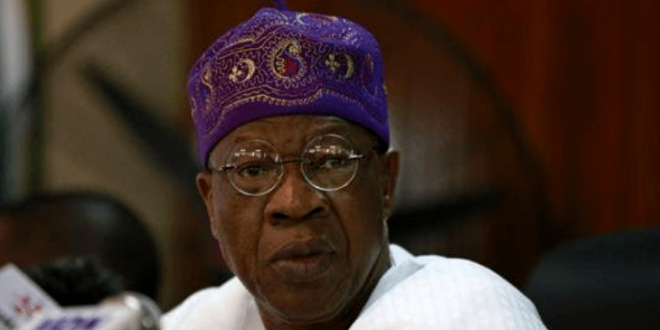The Minister of Information and Culture, Lai Mohammed, has said that former Vice President Atiku Abubakar’s treatise on Nigeria’s debt profile is nothing but scaremongering anchored on a false premise.
Recall that on Tuesday, Mr Abubakar had flayed President Muhammadu Buhari’s government for the nation’s debt stock, saying the future looks bleak for the country and its citizens.
In a statement entitled “Nigeria in Financial Crisis: Robbing our children to pay for our greed,” Mr Abubakar decried the nation’s debt-to-revenue ratio, adding that unless savings were prioritised, Nigeria would find it difficult to make genuine progress as a result.
In a statement on Wednesday by his Special Assistant on Media, Segun Adeyemi, the minister said while the Federal Government welcomes constructive criticism, such must be based on verifiable facts rather than conjectures and innuendos.
”There is no doubt that former Vice President Atiku Abubakar loves our country and wishes it well, otherwise he would not have sustained his serial quest for the country’s highest position.
“One can only hope that his resort to the use of such words as ‘precipice’, ‘foreclosure’ and ‘economic ruin’ does not reflect anything but best wishes for the country at this time,” he said.
Mr Mohammed said the figure of Nigeria’s debt to revenue ratio of 99% in the first quarter of 2020, quoted by the former Vice President, is not in the Medium-Term Expenditure Framework and Fiscal Strategy Paper, where he claimed he got it from.
”We are also not able to ascertain the source of the first quarter figures of N943.12 billion for debt servicing and N950.56 billion for retained revenue, which he also quoted,” he said..
The minister said the debt service provisions in the annual budgets include principal repayments, interest payments and all other applicable charges, adding: ”Therefore, the statement that debt servicing does not equate to debt repayment is not only wrong, but
ill-informed.”
According to him, contrary to the statement credited to Mr Abubakar that Nigeria has experienced alarming and unprecedented increase in the ratios of debt to GDP and debt service to revenue, indeed, Nigeria’s ratio of debt to GDP is one of the lowest in the world at 19.00% as at December 31, 2019, while government is making concerted efforts to increase revenue so as to bring down the ratio of debt service to revenue.
”One of the reasons why debt service to revenue is high is because revenue generation in Nigeria has been low, with over-dependence on the oil sector.
“This is corroborated by the fact that the ratio of Nigeria’s tax revenue to GDP is one of the lowest in the world at about 6%,” the Minister said.
He said unlike what obtained in the past, when the nation borrowed to service the crass indulgence of a few fat cats, the loans being obtained by the current Administration are being primarily used to finance infrastructure projects, which include roads, railways, bridges and power, and the loans are long-term in nature, which would benefit present and future generations.
”We have said that in the face of massive infrastructural decay, no responsible government will sit by and do nothing. This Administration’s borrowing, therefore, is aimed mostly at revamping our infrastructure.
“The loans for the educational sector will contribute to the development of our human capital while the loans for the agricultural sector will help the move to diversify the economy,” Alhaji Mohammed said.
He said despite the negative impact of the COVID-19 pandemic on the country’s economy, the Federal Government has continued to take measures to mitigate the effects of the pandemic, and assured that the Government will always act in the best interest of Nigerians.






